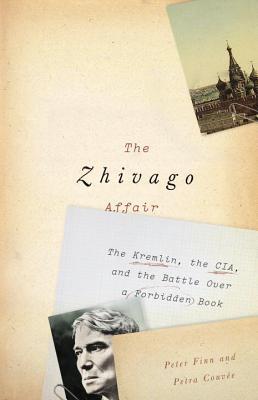 If this book were a web article, I'd call the title clickbait, because it's pretty misleading. After taking a class about Soviet and CIA operations during the Cold War a few years ago, I've been drawn to true spy stories, and thought this would be another one. It's really not. In fact, The Zhivago Affair isn't really about the Kremlin, the Cia, or the battle over a forbidden book. It's more about the book itself and the reaction to it, both inside and outside the Soviet Union, and the trouble that it caused the author, Pasternak. While there is some involvement of the Kremlin (who banned the book, without having ever read it) and the CIA (who printed copies to give to people traveling to the Soviet Union as part of a campaign to introduce a wider variety of viewpoints behind the Iron Curtain) it's mostly about Pasternak and those directly involved with him, and his struggle to stand by his work while facing derision from many officials in the USSR.
If this book were a web article, I'd call the title clickbait, because it's pretty misleading. After taking a class about Soviet and CIA operations during the Cold War a few years ago, I've been drawn to true spy stories, and thought this would be another one. It's really not. In fact, The Zhivago Affair isn't really about the Kremlin, the Cia, or the battle over a forbidden book. It's more about the book itself and the reaction to it, both inside and outside the Soviet Union, and the trouble that it caused the author, Pasternak. While there is some involvement of the Kremlin (who banned the book, without having ever read it) and the CIA (who printed copies to give to people traveling to the Soviet Union as part of a campaign to introduce a wider variety of viewpoints behind the Iron Curtain) it's mostly about Pasternak and those directly involved with him, and his struggle to stand by his work while facing derision from many officials in the USSR.This isn't a very long book--less than 300 pages, which is fairly short for a nonfiction book regarding the Cold War, but it wasn't a particularly riveting read. Maybe I would have been more interested if I'd known what the book was really about going into it; as it was, I found myself putting it down often to read other things that were more interesting. Knowing about how history has treated people it views as dissenters, either rightly or wrongly (when Krushchev, one of the Soviet leaders who was eventually ousted by his compatriots, eventually read the book, he said there was "nothing Soviet" about it) is important, but at the same time I'm not quite sure there was 266 pages of things worth knowing in this. It was interesting reading about how Pasternak reacted to his persecution, and how others both inside and outside of the Soviet Union reacted to Doctor Zhivago and Pasternak's treatment, but it was...pretty much all the same? There wasn't a lot of repetition, but once you realize that Pasternak was being persecuted by the Soviet administration, there's not really that much more to it. It never really stops, right up until Pasternak dies, and if you know anything about the USSR, you wouldn't really expect it to.
The bits about the CIA are very short--maybe a chapter and a half total, focusing on the CIA publishing copies of Doctor Zhivago in Russian and getting them into the hands of Soviet citizens both at home and abroad, at the World's Fair and at a youth festival. The bits about the Kremlin are very short, too; a few parts about different people being followed or interrogated about the novel, royalties coming in from abroad, stuff like that. There really is no "battle" over the book, at least not between the Kremlin and CIA; if there's any sort of battle, it's in the press and with the Nobel Prize Committee. Overall, the story, while interesting and historically important, wasn't what it was made out to be, and that's worth keeping in mind when going into this book. It was okay, but not particularly riveting, and it's not a nonfiction book I would pick up again.
2 stars out of 5.
No comments:
Post a Comment